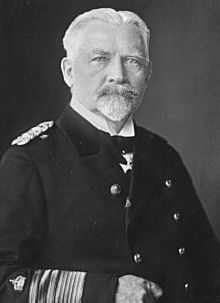Ludwig von Schröder
| Ludwig von Schröder | |
|---|---|

Ludwig von Schröder
|
|
| Born | 17 July 1854 Hintzenkamp near Eggesin, Kingdom of Prussia |
| Died | 23 July 1933 (aged 79) Berlin-Halensee, Germany |
| Buried at | Invalidenfriedhof Berlin |
| Allegiance |
|
| Service/branch |
|
| Years of service | 1871–1918 |
| Rank | Admiral |
| Commands held | Marinekorps Flandern |
| Battles/wars | World War I |
| Awards | Pour le Mérite with Oak Leaves |
| Relations | Ludwig von Schröder (son) |
Ludwig von Schröder (17 July 1854 Hintzenkamp near Eggesin – 17 July 1933 in Berlin-Halensee) was a Prussian officer and Admiral during World War I and a recipient of the Pour le Mérite with Oak Leaves. Schröder entered the newly established Imperial Naval Service in May 1871. Prior to World War I, he served on several different ships and commanded the Blitz, as well as the training vessel the Moltke. He additionally functioned as the Chief of the Cruiser-Class Division in the West Indies. Von Schröder retired from active duty in 1913. One of his final assignments was as the commander of Marinestation der Ostsee.
As the war broke out on both fronts, von Schröder was recalled and named commanding Admiral in Flanders, where he was in charge of both the seagoing forces and most of the naval infantry, which by mid-December 1915 became officially known as the Marinekorps Flandern. He was in command during the 1916 Battle of Dover Strait, the successful German attack on the Dover Barrage. After transfer to the Baltic and near the war's end, von Schröder was ordered by the Kaiser to take action against mutineering German sailors in Kiel. He advised Reichskanzler Max von Baden that the proposed measures were too harsh, and the orders were thus not carried out. Ludwig von Schröder died in Berlin-Halensee on 23 July 1933 and was buried at the Invalidenfriedhof. His son Ludwig was a general in the Wehrmacht during World War II.
...
Wikipedia
